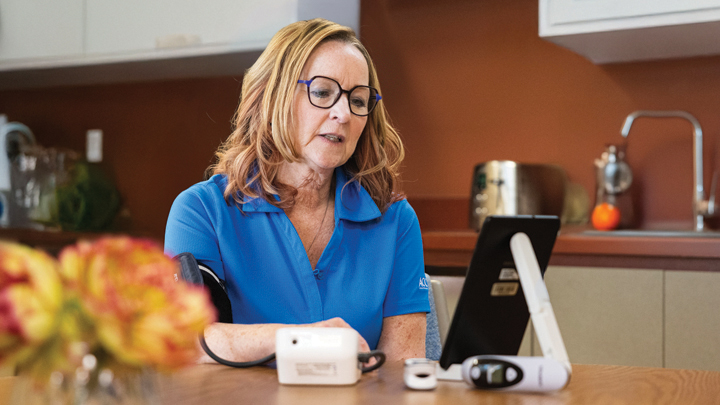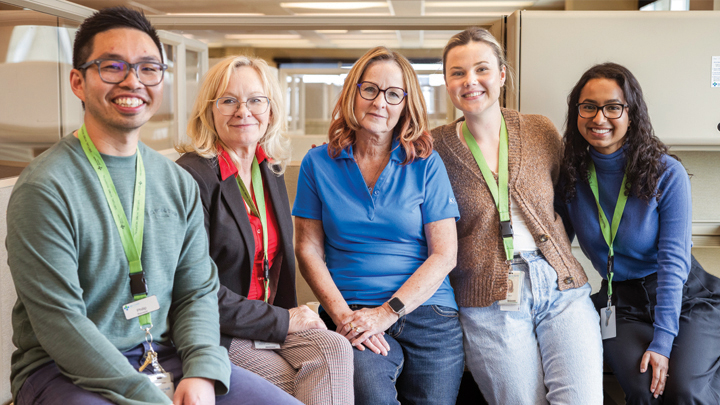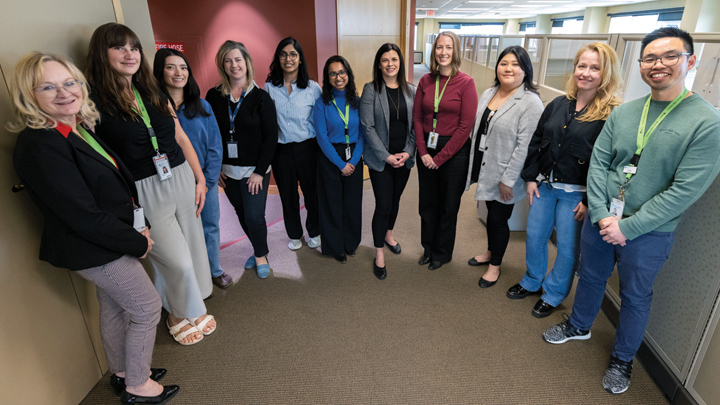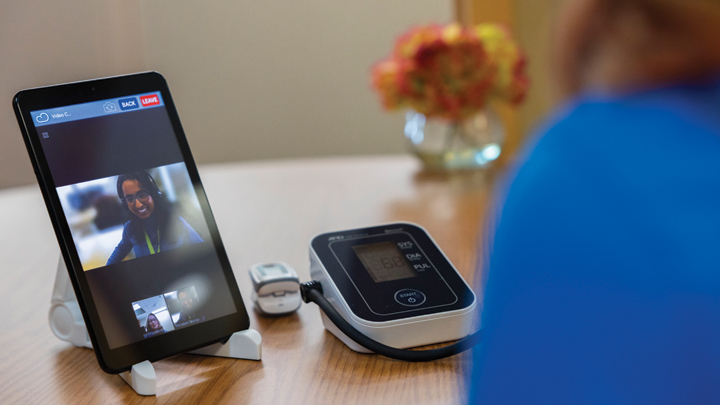
June 13, 2025

Cheryl Bozek uses digital remote patient monitoring equipment to talk to members of her care team virtually, while also tracking her vital signs. Photo by Evan Isbister.

Cheryl Bozek, centre, is seen with the members of the Edmonton Zone Virtual Home Hospital (EZVHH) surgery team, from left, pharmacist Phil Ha and nurses Tammy Daum, Allison Eccles and Vanessa George. Photo by Evan Isbister.

The EZVHH comprises a multidisciplinary team of healthcare professionals who provide acute virtual care to patients in the Edmonton area. Photo by Evan Isbister.

Nurse Vanessa George connects with patient Cheryl Bozek through a tablet, where she can also review her vital signs using the digital remote patient monitoring kit. Photo by Evan Isbister.
Story by Katie McLaughlin | Photos by Evan Isbister
EDMONTON — Cheryl Bozek arrived at the Royal Alexandra Hospital for surgery in March. After years of managing her Crohn’s disease under the guidance of both a gastroenterologist and naturopath, she learned the disease had progressed, and she needed to have an ileocecal resection. This procedure involves removing part of the small intestine and colon and, in Bozek’s case, the appendix.
“After the surgery, I found out the surgeon removed around three feet of my small intestine,” says Bozek. “There was evidence of disease in another segment that didn’t show up on the CT scan, so it was a more significant surgery than I anticipated.”
Bozek spent a couple of nights admitted to the hospital, l but was more than ready to continue her recovery in the comfort of her own home, rather than in hospital, she found it difficult to rest. That’s when her surgeon recommended the Edmonton Zone Virtual Home Hospital (EZVHH), a program Bozek had never heard of before, but felt would be exactly what she needed.
“Cheryl was eager to go home after her surgery,” says Dr. Dana Mihalicz, a general surgeon and associate clinical professor at the Royal Alexandra Hospital. “Recovering in the comfort of your own home while getting individualized care is exactly what the EZVHH offers patients, so we discussed that care option together and decided to refer her to the program. She was well taken care of by the team and had a peaceful recovery environment.”
Bozek was then admitted as a patient to the EZVHH surgery unit and went home the next morning to continue her recovery while receiving support from a multidisciplinary team of healthcare professionals in Edmonton.
“I immediately felt like I had the support I needed,” says Bozek. “I had regular calls with the nurses and was able to connect with the pharmacist when I had questions. At one point during my care, I had some bleeding that I was concerned about, and they sent over a mobile collection unit from Alberta Precision Laboratories to do some bloodwork in my home.”
In addition to the calls, Bozek was given a set of equipment — a digital remote patient monitoring kit — that allowed her care team to remotely monitor her vitals, such as blood pressure and heart rate.
“Knowing there was a team monitoring me gave me a sense of peace and comfort,” she adds. “Being in my own home, eating my own food and sleeping in a comfortable environment was a much better experience for me. I felt safe and cared for, and I knew that if I was really struggling with something, I could reach out for support. The whole team was very professional, caring and compassionate.”
The EZVHH care team includes healthcare professionals such as doctors, nurses, nurse practitioners, pharmacists who coordinate with other healthcare professionals, including a patient’s primary care provider, if they have one. They provide care to medicine, cardiology, neurology, women’s health, urology, bariatric and surgery patients, including general, orthopedic and cardiac surgery.
The surgery unit that cared for Bozek began in 2020 as part of a study — and has since continued to grow.
“We’ve worked with surgical partners across the Edmonton region to offer their patients an option to receive post-operative care at home,” says Dr. Greg Hrynchyshyn, medical director of the EZVHH. “We’ve developed pathways with these partners that allow us to transition patients out of the hospital sooner, while ensuring they receive monitoring and care at home through our program.”
In addition to the benefits of continuing their recovery from the comforts of home, Hrynchyshyn says there are other benefits of receiving care through the EZVHH, such as increased mobility and independence, increased satisfaction with the care they receive, and a lower risk of complications that may be more likely to occur in a hospital setting — including patients picking up cold viruses, like Bozek did during her short stay.
Bozek was a particularly special patient for the EZVHH team — she was their thousandth patient admission for the 2024/25 fiscal year — a record. That’s the largest number of admissions EZVHH has seen in a single year since it launched in 2018.
“Our admissions continue to grow year after year,” says Lisa Marco, patient care manager of EZVHH. “This reflects the amazing care our team provides and the difference they make in the lives of our patients. It’s an exciting time for us.”
Hrynchyshyn says the team has plans for expansion over the next few years. They hope to expand their women’s health program — which currently focuses on peripartum hypertension — to all sites in the Edmonton zone that deliver babies. He also hopes to expand their cardiology and surgical team.
“Right now, we have 75 virtual beds for patients, and we hope to take that to 175 in the next few years,” he adds. “We couldn’t do this without the physicians and surgeons who support this program, or the patients who refer others based on their own positive experience.”
Those patients include Bozek, who confidently states: “I would 100-per-cent refer others to the program.”
See more information about AHS’ Virtual Home Hospital program, offered in Edmonton and Calgary.